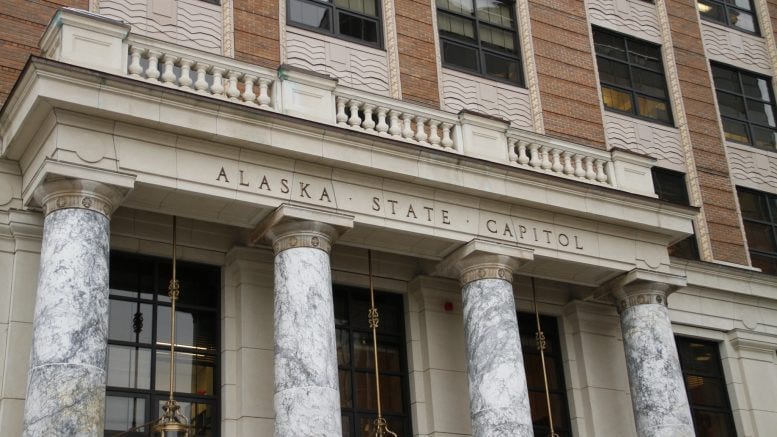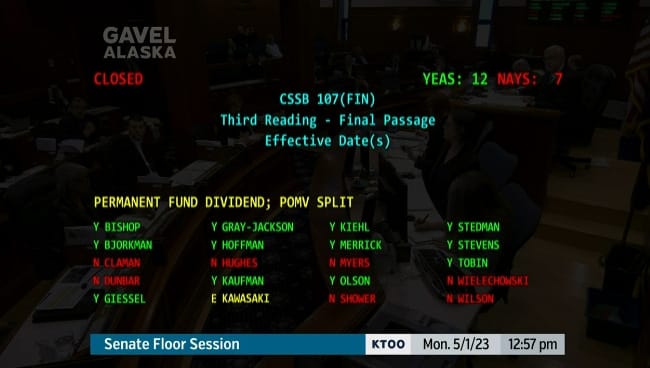Day 105: The home stretch
We’re into the final stretch of the session, and it’s time for things to get weird.

Happy May Day, Alaska! It’s Day 105 of the legislative session.
In this edition: We’re into the final run of the 2023 regular legislative session, and it’s the time of year when long-dormant bills start to poke through in the mad dash to the end of the session. That includes the far-right effort to repeal open primaries and ranked-choice voting, which will be up for an unusual public hearing on Tuesday that’s setting off some alarm bells. Meanwhile, the Senate passed a new PFD formula today, marking the first time in more than eight six years that either chamber has advanced a rewrite on an issue that has sucked much of the oxygen out of the Legislature’s work. Also, the reading list.
Current mood: 🤧
The home stretch and things around the corner

We’re into the final stretch of the session, and it’s time for things to get weird.
Last week, the governor finally caught up with 2015 and admitted that we might finally need some new taxes to put the state onto a more stable financial course, suggesting they might pass a tax in the next two-and-a-half weeks. The Senate today passed a new formula for the Alaska Permanent Fund dividend. Of course, a budget still needs to be negotiated and passed. And all sorts of bills await their opportunity to slide into law before the session clock runs out on May 17.
One bill garnering a lot of attention—and a fair bit of fretting—is House Bill 4, far-right Homer Republican Rep. Sarah Vance’s bill to repeal the state’s ranked-choice voting system. After being ignored for the entirety of the legislative session, the bill popped up for a hearing in the House State Affairs Committee on Tuesday that will not only be its first hearing of the session but will be a public hearing at that. Holding a public hearing at its first hearing is unusual, signaling something is up.
Let’s be clear, a repeal of ranked-choice voting has almost zero chance of passing through the normal legislative process. The bipartisan Senate Majority and its moderate Republicans who can thank the new system—specifically the open primary system where hard-right conservative voters are no longer in the driver’s seat of deciding what flavor of Republicans are sent to Juneau—for their victories have only signaled opposition to a repeal of the system.
That said, there’s always the possibility of some last-minute hijinks, like the House attempting to staple the legislation onto a Senate bill in hopes it can sneak through. Frankly, it all seems like a long shot, especially when several on the Senate side of the thing are deeply invested in the continuation of the election system. Still, it’s sent me down a rabbit hole of the history of logrolling, and I was surprised to find out it happens quite a bit more than I thought it had.
I’ll have more on that in The Alaska Current, but for now, here’s how to testify on the potential repeal of RCV and open primaries:
The House State Affairs Committee meets at 3 p.m. on Tuesday. You can testify in person at the capitol or by phone at the following numbers (that are good for any public hearing in the Legislature):
- Anchorage: 907-563-9085
- Juneau: 907-586-9085
- Everyone else: 844-586-9085
Read more: Bill to repeal ranked-choice voting gets public hearing
Senate passes new PFD bill

Correction: Thanks to for catching my bad memory here. The SB 26 that Sen. Hoffman was talking about passed out of the Senate in 2017, not 2015.
The Senate today passed a bill to update the state’s formula determining the size of the Alaska Permanent Fund dividend, marking the first time in more than eight six years that a chamber of the Alaska Legislature made a run at changing the cash payout.
Senate Bill 107 follows the stepped approach that the Senate has seemed to coalesce around in recent weeks. It would start by paying out a dividend equal to 25% of the spendable earnings of the Alaska Permanent Fund, about $1,300. Then, it would allow for larger dividends in the future if the state hits benchmarks for significant new revenue and additional savings by 2031. Hit those goals, and the rate would ratchet up to 50% of the spendable earnings, or about $2,700 under today’s returns.
The targets are very high at $1.3 billion in new revenue and $3.5 billion in the state’s key savings account (currently around $2.5 billion). While the hurdles are high—possibly impossibly high—it’s what Senate Finance Committee co-Chair Sen. Bert Stedman says is needed if the government is to be everything to everyone.
Want to pay out a 50-50 PFD while meeting the state’s pressing needs around public education, public safety, infrastructure and keeping up with inflation? Then this is what’s needed, he told the Senate during the debate today.
“We haven’t built any new schools in several years,” he said. “One of our fundamental tasks is to build them and educate our children. … We factored in all that stuff, and that’s where we came up with $1.3 billion.”
Far-right Republicans and a handful of Anchorage Democrats opposed the legislation.
Republicans grumbled that the benchmarks were impossible to achieve, making the legislation a de facto cut to the dividend that’s just teasing Alaskans with the notion of a larger dividend in the future. They also bristled at the idea that you’d be raising taxes to pay for a dividend, arguing that the larger PFD they favored would be drawn first from the spendable earnings of the Alaska Permanent Fund while services would come out of the new taxes (frankly, a distinction without a difference).
Sen. Matt Claman, one of the three Anchorage Democrats to vote against the bill, said the whole issue of raising taxes to pay for a dividend was precisely why he was voting against it. He said his constituents could support new taxes, but only if they support state services rather than propping up a cash payout.
“I see this bill as an example of places where we are suggesting there will be taxes coming, and the purpose of those taxes will be primarily to pay a dividend,” he said. “I believe the majority of Alaskans are actually in a place where they don’t want to see new taxes, and they want to follow the constitutional direction of using public funds to pay for public safety, public education, public health and capital investment.”
The debate also contained a fair bit of talk about a fiscal plan, with the far-right Republicans arguing that the all-in approach recommended by the legislative fiscal working group should still be the leading approach. They argued that this PFD bill, with its incentives for additional revenue, was premature.
Sen. Lyman Hoffman, D-Bethel, carried the bill on the floor and, in closing, recalled that the Senate passed a change to the PFD formula back in 2017 before the House rejected it. He said the state had been essentially stuck since then with the fight over the size of the dividend consuming all the political attention, and it’s time to move on.
“Everyone says the current law is unaffordable. I think everyone in the room realizes that, but unless we come up with some method that pins something down, I firmly believe we’re stuck in the mud. We’re moving nowhere fast,” he said. “This is a major step forward. I would urge members to give us a chance to move forward so we can address other issues that this state needs to address.”
What’s next: The legislation faces unlikely chances in the Republican-led House but could serve as a legislative vehicle for pieces of a state fiscal plan.
Follow the thread: The Senate debates and votes on SB107
The Alaska Memo by Matt Buxton is a reader-supported publication. To receive new posts and support my work, consider becoming a free or paid subscriber.
Reading list
- Gov. Dunleavy is going hard on new taxes all of a sudden and seems confident something can be done quickly. The only problem is that there’s no clear road map for the fiscal plan or even pass a budget. From Alaska Public: With 20 days left in the session, Alaska governor and legislative leaders say they’re optimistic about budget and fiscal plans
- The state’s food stamp system is still in crisis. From the Alaska Beacon: Alaska food banks still ‘inundated’ as state works to fix food stamp backlog
- The state’s public guardian system is in crisis. From the ADN: State agency serving vulnerable Alaskans declines to take new cases amid staffing crisis
- Wish I had class when I was in school. From the Alaska Beacon: Bill to mandate financial education is intended to help address Alaskans’ pocketbook problems
- Anchorage’s attempting to wind down its mass shelter for the second time. From Alaska Public: As Anchorage’s mass shelter winds down, workers push to smooth transition for homeless residents
- Anchorage is still waiting on body cameras, but they’re just around the corner for the Alaska State Troopers. From Alaska Public: Policy finalized to put body cameras on Alaska State Troopers
The Alaska Memo Newsletter
Join the newsletter to receive the latest updates in your inbox.




